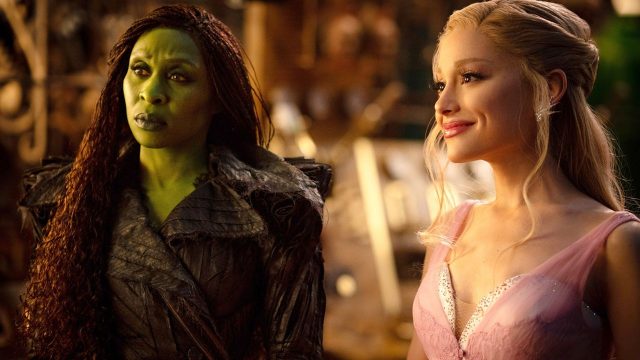
‘Wicked: For Good’
Directed by John M. Chu (PG)
★★★
John M. Chu’s highly anticipated second installment of Wicked “delivers what we might call the ‘whew factor,’ as in: Thank goodness, he didn’t blow it,” said Peter Debruge in Variety. But the film also does more. After last year’s Part 1 “succeeded in wowing audiences,” racking up $750 million worldwide, it would have been enough to follow up with a merely solid rendition of Act 2 of the stage musical based on Gregory Maguire’s revisionist Oz-set novels. Instead, this movie addresses a common complaint about the show’s back half, giving green-skinned Elphaba and her former roommate Glinda more scenes together and adding enough story content that Act 2 “now feels like a robust tale unto itself.”
To me, this chapter of the tale still makes “little emotional sense,” said Jesse Hassenger in A.V. Club. As it opens, Cynthia Erivo’s Elphaba has been unfairly vilified as the Wicked Witch of the West and Ariana Grande’s Glinda is trying to defend her friend while serving as a spokeswoman for Oz’s increasingly autocratic government. But that premise requires that viewers ditch their warm feelings for the original Wizard of Oz, and here, when the arrival of Dorothy’s tornado-tossed house sets the 1939 film’s plot in motion, “the fun really drains from the movie.” Yes, this is an “altogether darker” work than Part 1, said Bilge Ebiri in NYMag.com, but that’s a strength. As Glinda gradually realizes that she has to move past her people-pleasing tendencies, For Good becomes a “surprisingly relatable portrait of how the world eventually forces us all into dark corners.” In this part of the tale, Glinda takes center stage, and a “shocking amount of the picture plays out on Grande’s face.”
‘Rental Family’
Directed by Hikari (PG-13)
★★
Rental Family is a nice movie of the kind that’s “lit brighter than a dentist’s office” and “aimed toward a heart-stirring conclusion about the power that we all have to affect each other’s lives,” said David Ehrlich in IndieWire. The movie can get “treacly,” but it’s also unsentimental enough at heart to recognize that true human connection and performance aren’t so easily separated. Oscar winner Brendan Fraser plays a struggling American actor living in Tokyo who begins working for a rental family service—one of the many in real-world Tokyo that hires out actors to temporarily fill roles in customers’ lives. And while the premise suggests “a banal family comedy,” said William Bibbiani in The Wrap, Rental Family is actually “a love letter to humane performances, the type of roles Fraser always excels at.”
His character, Phillip, portrays a mourner at a funeral, a groom at a fake wedding, and a young girl’s long-absent father. The sum of those scenes is “a complex conversation about the craft of acting,” one that doesn’t ignore fakery’s hazards. And while these provocations are interesting, “it’s easy to struggle with how exactly we’re supposed to feel about all this.” Most surprisingly, Rental Family “displays an almost admirable amount of restraint in its tear-jerking,” said Esther Zuckerman in The Daily Beast. The movie is “so restrained,” in fact, that it barely sketches out Phillip’s character. “You leave itching for more of his inner life.”
Glinda the Good is forced to choose sides and an actor takes work filling holes in strangers’ lives






